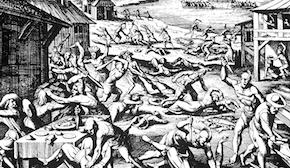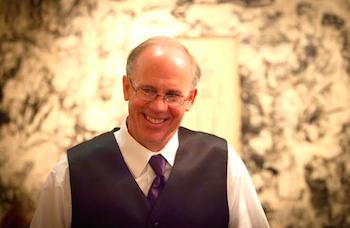James Rice, a historian of early America who carefully considers the connections between nature and culture, is the new Patrick Henry Writing Fellow at Washington College’s C.V. Starr Center for the Study of the American Experience.
Working from an office in the circa-1746 Custom House on the Chester River, and living in a 1730s house in Chestertown’s historic district, Rice will be in an ideal locale to continue his research and writing on the colonial-era Chesapeake region. During his yearlong fellowship, he will work on completing a narrative account of the “Powhatan Uprising” of 1622.
On Thursday, September 4, Rice will give a presentation at Washington College titled “At a Given Signal: The Powhatan ‘Uprising’ of 1622.” Co-sponsored by the Rose O’Neill Literary House, the lecture, followed by a book signing, will begin at 4:30 p.m. in Hynson Lounge, Hodson Hall, on the Washington College campus, 300 Washington Avenue. The program is free and open to the public.
The 1622 Powhatan Uprising – also known as the “Massacre of 1622” or the “Great Assault” – may have killed as many as a third of the Virginia settlers, and modern archaeologists have unearthed grisly evidence of that slaughter. It failed to destroy the Jamestown colony, however, and in fact provoked a far more aggressive English policy toward the Native Americans.
“The attack was one of the most dramatic and pivotal moments in early American history,” says Adam Goodheart, the Starr Center’s Hodson Trust-Griswold Director. “Yet for some reason, there’s never been a full-scale account before. It usually just draws a brief mention in larger histories. Rice’s book will thus be a landmark, especially since he is a gifted storyteller as well as an innovative scholar. I’m delighted that the Starr Center can help bring it to fruition.”
In his talk, Rice will show how the key to understanding the Uprising and its long-term historical significance lies in the complex relationships between the Powhatan chiefdom and the Chesapeake’s many other Native American nations. “My work as a historian aims for new insights into ‘how things worked,’ he says. “I try to clarify why events happened by reframing them, by bridging time periods that are usually assumed to be separate entities (such as ‘prehistory’ and ‘colonial America’), and by fully integrating the histories of Native Americans with those of European and African newcomers.”
A professor of history at SUNY Plattsburgh, Rice is the author of Nature and History in the Potomac Country: From Hunter-Gatherers to the Age of Jefferson (Johns Hopkins University Press, 2009) and Tales from a Revolution: Bacon’s Rebellion and the Transformation of Early America (Oxford University Press, 2013). In addition to his project on the Powhatan Uprising, he is currently working on an environmental history of Native Americans in North America from the last ice age to the present day. The book is under contract with Cambridge University Press. Rice has been a scholar in residence at the Virginia Foundation for the Humanities, and a Carson Fellow at Ludwig-Maximilians-Universität in Munich.
As part of his Washington College residency, he will teach a spring-semester course titled “Native America, Modern America.”
Launched by the Starr Center in 2008, the Patrick Henry Fellowship aims to encourage reflection on the links between American history and contemporary culture, and to foster the literary art of historical writing. It is co-sponsored by the Rose O’Neill Literary House, Washington College’s center for literature and the literary arts. The Patrick Henry Writing Fellowship’s funding is permanently endowed by a grant from the National Endowment for the Humanities with further support provided by the Starr Foundation, the Hodson Trust, and other donors.
Washington College acquired the Patrick Henry Fellows’ Residence in January 2007 through a generous gift from the Barksdale-Dabney-Patrick Henry Family Foundation, which was established by the Nuttle family of Talbot County, direct descendants of the patriot Patrick Henry.
Founded in 1782 under the patronage of George Washington, Washington College is a private, independent college of liberal arts and sciences located in colonial Chestertown on Maryland’s Eastern Shore. Based in the Custom House along the colonial waterfront, the College’s C.V. Starr Center for the Study of the American Experience fosters the art of written history and explores our nation’s past—particularly the legacy of its Founding era—in innovative ways, through educational programs, scholarship and public outreach. For more information on the Center and the Patrick Henry Writing Fellowship, visit https://starrcenter.washcoll.edu.




Write a Letter to the Editor on this Article
We encourage readers to offer their point of view on this article by submitting the following form. Editing is sometimes necessary and is done at the discretion of the editorial staff.